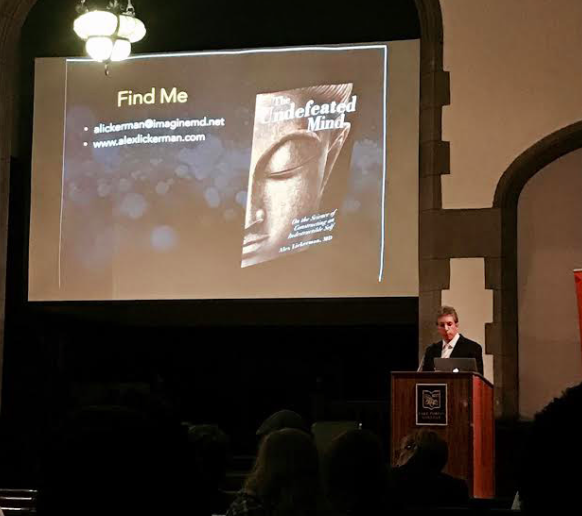As part of its developing Resiliency Program, Lake Forest College hosted Dr. Alex Lickerman on November 2nd to speak on the topic of “thriving in the face of adversity.” This event was one of Lake Forest College’s signature Forester Five events focused on the theme of “Think With Purpose.”
Lickerman is the author of The Undefeated Mind: On the Science of Constructing an Indestructible Self, a book that combines Buddhist principles and scientific research to reveal the importance of resiliency in constructing happy lives. Lickerman’s talk fused the insights from his book with findings from a course he leads at The University of Chicago.

Pictured: Dr. Alex Lickerman
The course, called “The Resilience Project,” teaches students practical ways to implement resiliency into their lives through eight “core interventions.” During his presentation at Lake Forest College, Lickerman expanded upon four of these interventions: “Expect Obstacles,” “Self-explanatory Style,” “Accept Pain,” and “Let Go.”
The first intervention, “Expect Obstacles,” explores how resilience can be learned by becoming immunized to obstacles. Lickerman compared our expectations of obstacles to that of lifting a weight. If someone lifts a 60-lb. weight expecting it to be 10 pounds, he will approach the task with 10 pounds of force and fail to lift the weight. But if he expects difficulty, he will exert enough force to handle the weight.
“Self-explanatory Style,” according to Lickerman, is a person’s way of explaining why things happen. These stories tend to either attribute failure to intrinsic flaws (i.e. “I’m a bad test taker”) or attribute failure to a particular behavior (i.e. “I did not study enough for that test”). Lickerman explained that these explanations are never entirely true, but they directly impact our moods. Rather than blaming experiences on internal or external problems, “Go after an explanation that changes your life story,” said Lickerman.
Lickerman’s third intervention is “Accept Pain.” Pain, he said, is necessary for human survival. Yet although pain protects us, we often run from it. This tendency to escape unpleasant feelings is paradoxical. “In avoiding legitimate pain, we end up causing far more suffering,” said Lickerman. “When you accept your feelings and acknowledge that you can handle them, you will be able to accomplish things that, right now, you can’t imagine possible.”
Finally, Lickerman discussed the intervention called “Let Go.” Inspired by the Buddhist tenet of impermanence, this intervention is aimed at helping people successfully handle loss. “The key to getting over a loss is to let go of it in your heart,” he said. In even the most tragic cases of loss, acceptance precedes healing. “We do recover, we just don’t think we will,” he said.
Lickerman’s resiliency course has been shown to have tremendous effects on mental health. In one study mentioned during the presentation, participants scored 40 percent less depressed and 52 percent less anxious after taking the year-long course with Lickerman. These results are nearly identical to the results patients experience taking anxiety and depression medication.
Lake Forest College plans to implement its own Resiliency Program on campus over the course of the year. This speaking event was the initiator for a campus-wide discussion on resilience, which will continue through the Health and Wellness Center, The Career Advancement Center, and future campus events.



